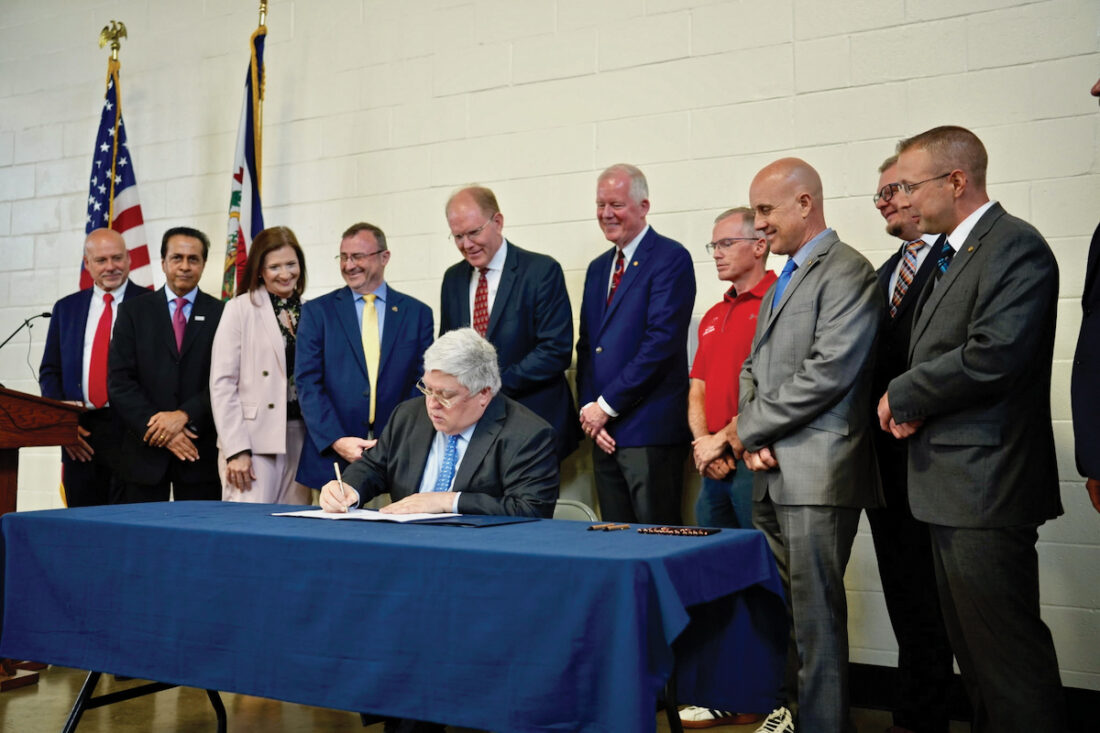Morrisey signs data center/microgrid bill

Submitted photo Gov. Patrick Morrisey signed power generation and consumption and one-stop shop permitting bills into law Wednesday.
MORGANTOWN — On the last day to sign bills, Gov. Patrick Morrisey used his pen to sign a bill meant to incentivize the location of data centers in West Virginia and encourage the use of coal-fired power plants to energize those centers.
Morrisey signed House Bill 2014, the Power Generation and Consumption Act, during a bill-signing ceremony Wednesday morning at the West Virginia Army National Guard Recruiting Center in Point Pleasant.
“West Virginia is America’s energy state, and this law is going to demonstrate it to the whole country that we are ready for action,” Morrisey said. “We are going to be leveraging our natural resources in a way you’ve never seen before, and it’s going to lead to the betterment of our citizens.”
HB 2014 is aimed at attracting high-impact industrial businesses and data centers to West Virginia, along with microgrids to power the data centers, using both fossil fuels or renewable energy generation. Morrisey said the bill was a first step in making West Virginia competitive in a national and international stage against countries such as China.
“As I’ve said, many, many times, China already generates half of the world’s coal-fired power, and they’re building coal-fired power plants seemingly every week. It actually gives it a huge advantage in the arms race for computing power and superintelligence,” Morrisey said. “America must dramatically increase our power production – its coal and gas, in particular – or China will win the technological battle that will determine our future. That’s not acceptable.”
HB 2014 would streamline development of data center and microgrid projects, offer regulatory exemptions within designated microgrid districts, establish a special valuation for property taxes and a new tax distribution framework for high-impact data centers, and create a fund for electric grid stabilization.
HB 2014 makes changes to a law passed in 2022, Senate Bill 4001, that created the Certified Industrial Business Expansion Development Program, allowing for two certified microgrid districts. The program was created for Berkshire Hathaway Energy Renewables, which partnered with Precision Castparts Corp. (TIMET) for a new titanium melt facility/solar microgrid project on the site of the former Century Aluminum in Jackson County.
The new law expands the number of microgrid districts, allowing for microgrids for data centers if more than 70% of the electricity generated is consumed by or will be consumed by one or more data centers. Microgrids within these new districts would be exempt from jurisdiction of the state Public Service Commission regarding rates, certificates of convenience, service conditions, complaints and net metering and interconnection standards.
Projects in these districts would only be able to participate in the microgrid if they had not previously received electrical service from a utility and can show their new investment will not decrease load elsewhere. The bill protects regulated utility customers from bearing any costs associated with electricity generation, transmission or distribution facilities serving a microgrid district, with those costs borne by the generator or consumers within the district.
“If you’re thinking about a data center, you’ve got to look at West Virginia. Come while the getting is good, because we have some unbelievable things we’re doing. We’re streamlining the process,” Morrisey said. “Nothing in this bill prevents you from working with the utility and the main power grid. But if you’re looking for speed to build and you want to have flexibility, we’re going to provide that option to you so that you might have the ability to build in 24 to 30 months instead of six to eight years.”
Counties and municipalities are prohibited from enacting or enforcing ordinances, regulations or rules that would prohibit or hinder these data center/microgrid districts. Despite the exemptions, certified projects will still pay business and occupation tax, municipal sales and service tax, ad valorem real and personal property tax, municipal service fees and utility rates to the municipality.
However, instead of having data center property values assessed by the county, HB 2014 requires owners to file tax returns with the Board of Public Works annually. According to a formula in the bill, 50% of property tax collections from these projects would go to a personal income tax reduction fund, 30% would go to the county or counties where the data centers are located, 10% would go to all 55 counties on a per capita basis, and 5% would go to the state Economic Enhancement Grant Fund.
“If revenue comes in and even at a conservative estimate, we have an ability to lop off large percentage of our state’s income tax,” Morrisey said. “Maybe if we’re successful, it could be worth over half the amount we’re currently paying for the state income tax. Maybe more. We’ll see. I’m not going to overpromise. That’s not my style.”
Another 5% would go to a new Electric Grid Stabilization and Security Fund administered by the Department of Commerce to support electric grid stabilization and security, including coal and natural gas electric generation and transmission resources. But some county commissions have remained critical of the bill, claiming it is usurping their authority to collect property taxes. Morrisey pushed back against those criticisms.
“This is going to be off the charts for a lot of the counties,” Morrisey said. “That’s brand-new money, once again, that no one has right now. There are a lot of fights over the money. I always think it’s funny when you’re fighting over money that doesn’t exist, but that’s what happened here. This is a really good deal for counties, and it’s going to lead to generational opportunities. With the state working closely with the counties, we’re going to do this the right way.”
The location of Wednesday’s bill signing was no accident. It was near the location where Houston-based Fidelis New Energy and its subsidiary, Mountaineer GigaSystem LLC, are locating their Monarch AI data center campus. Fidelis announced in 2023 a $2 billion investment in Mason County for a project to provide clean hydrogen power to chemical manufacturers, transportation companies, other electric utilities and data centers with greenhouse gas emissions being pumped underground.
Morrisey was joined Wednesday by several lawmakers who championed HB 2014, including Senate Economic Development Committee Chairman Glenn Jeffries, R-Putnam, and House Energy and Manufacturing Subcommittee Chairman Bob Fehrenbacher, R-Wood.
“It will be, I feel, the most impactful piece of legislation that will come out of this last legislative session,” Fehrenbacher said.
“I think that today is a day of transformation in West Virginia…We see with this piece of legislation the opportunity for large economic development up and down the Ohio River,” Jeffries said.
Morrisey also signed House Bill 2002 Wednesday, creating a one-stop shop permitting program and permitting dashboard for obtaining and renewing permits issued through multiple state departments and agencies.



